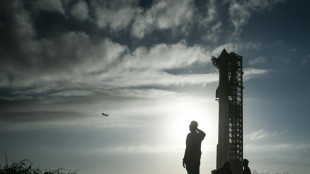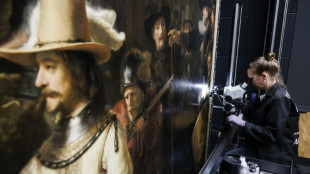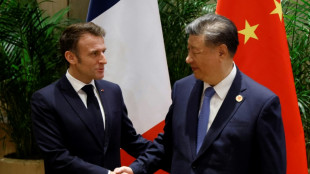
-
 US announces talks with Israel over civilian casualties in Gaza
US announces talks with Israel over civilian casualties in Gaza
-
SpaceX fails to repeat Starship booster catch, as Trump looks on

-
 G20 summit ends with Ukraine blame game
G20 summit ends with Ukraine blame game
-
Trump appoints TV celebrity 'Dr. Oz' to key US health post

-
 European stocks fall on Ukraine-Russia fears, US focused on earnings
European stocks fall on Ukraine-Russia fears, US focused on earnings
-
Last-gasp Szoboszlai penalty rescues Hungary draw with Germany

-
 Germany, Netherlands draw as Nations League group stage ends
Germany, Netherlands draw as Nations League group stage ends
-
Hong Kong tycoon Jimmy Lai takes witness stand in collusion trial

-
 Guardiola set to extend stay as Man City boss - reports
Guardiola set to extend stay as Man City boss - reports
-
Minnows Botswana hold Egypt to qualify with Mozambique, Tanzania

-
 Inter Miami coach Martino leaving club for 'personal reasons' - club source
Inter Miami coach Martino leaving club for 'personal reasons' - club source
-
Chinese man sentenced to 20 months for Falun Gong harassment in US

-
 Hong Kong court jails 45 democracy campaigners, drawing condemnation
Hong Kong court jails 45 democracy campaigners, drawing condemnation
-
'I did it for Rafa': Alcaraz after keeping Spain Davis Cup dream alive

-
 Alcaraz keeps Spain and Nadal Davis Cup dream alive
Alcaraz keeps Spain and Nadal Davis Cup dream alive
-
Trump names China hawk Howard Lutnick commerce secretary

-
 Europe's pivotal role in bid to strike COP29 climate deal
Europe's pivotal role in bid to strike COP29 climate deal
-
MotoGP champion Martin falls on Aprilia debut

-
 Bodies burned after Haiti police, civilians kill 28 alleged gang members
Bodies burned after Haiti police, civilians kill 28 alleged gang members
-
'Probably my last match': Nadal after Davis Cup singles defeat

-
 Iran faces new censure over lack of cooperation at UN nuclear meeting
Iran faces new censure over lack of cooperation at UN nuclear meeting
-
Afghan woman teacher, jailed Tajik lawyer share top rights prize

-
 Pressure mounts on Scholz over bid for second term
Pressure mounts on Scholz over bid for second term
-
Take two: Biden makes it into G20 leaders' photo

-
 Russia vows response after Ukraine fires long-range US missiles
Russia vows response after Ukraine fires long-range US missiles
-
Spain's Nadal loses in Davis Cup quarter-finals singles opener

-
 Four elite Brazil officers arrested over alleged 2022 Lula murder plot
Four elite Brazil officers arrested over alleged 2022 Lula murder plot
-
SpaceX set for Starship's next flight -- with Trump watching

-
 Trump ally seeks to block trans lawmaker from women's restrooms
Trump ally seeks to block trans lawmaker from women's restrooms
-
Slovakia oust Britain to meet Italy in BJK Cup title match

-
 Top-selling daily French daily Ouest-France stops posting on X
Top-selling daily French daily Ouest-France stops posting on X
-
Russian invasion toll on environment $71 billion, Ukraine says

-
 'Sabotage' suspected after two Baltic Sea cables cut
'Sabotage' suspected after two Baltic Sea cables cut
-
'You will die in lies!': daughter clashes with father at French rape trial

-
 Spain Women drop veterans Paredes and World Cup kiss victim Hermoso
Spain Women drop veterans Paredes and World Cup kiss victim Hermoso
-
Stocks diverge on fears of Ukraine-Russia escalation

-
 New Botswana leader eyes cannabis, sunshine to lift economy
New Botswana leader eyes cannabis, sunshine to lift economy
-
'Operation Night Watch': Rembrandt classic gets makeover

-
 Haiti police, civilians kill 28 gang members: authorities
Haiti police, civilians kill 28 gang members: authorities
-
Taxing the richest: what the G20 decided

-
 'Minecraft' to come to life in UK and US under theme park deal
'Minecraft' to come to life in UK and US under theme park deal
-
IMF, Ukraine, reach agreement on $1.1 bn loan disbursement

-
 Japan on cusp of World Cup as Son scores in Palestine draw
Japan on cusp of World Cup as Son scores in Palestine draw
-
Chelsea condemn 'hateful' homophobic abuse towards Kerr, Mewis

-
 Hamilton to race final three grands prix of Mercedes career
Hamilton to race final three grands prix of Mercedes career
-
Gatland has not become a 'bad coach' says Springboks' Erasmus

-
 Slovakia take Britain to doubles decider in BJK Cup semis
Slovakia take Britain to doubles decider in BJK Cup semis
-
Brazil arrests soldiers over alleged 2022 Lula assassination plot

-
 Ukraine war and climate stalemate loom over G20 summit
Ukraine war and climate stalemate loom over G20 summit
-
Ukraine fires first US long-range missiles into Russia


New life breathed into Tunisia's bagpipes
At his workshop in Tunisia's capital, Khaled ben Khemis pieces together a type of bagpipe once banned from airwaves but now embraced by artists infusing its sound into new musical styles.
Known as a "mizwad", it "must be made from natural elements", the 50-year-old craftsman said, taking two cow horns and connecting them to pieces of river reed and a goatskin bag for producing the musical notes.
He has made the instrument for 30 years.
Most musical historians agree the mizwad first appeared in Tunisia at the beginning of the 20th century and was confined to working-class suburbs for decades before growing in stature to now be incorporated into other genres, including hip-hop and jazz.
The increased popularity has seen commercial manufacturers turning out mizwads.
But modern variations that replace natural materials with plastic "do not have the soul of those made with reeds", ben Khemis said of the new models, which cost up to 1,000 dinars ($320).
He acknowledged the instrument has, however, evolved.
"Before we played out of tune, and we made it in a hurry," he said.
- Bad image -
The mizwad spawned its own musical style that was frowned upon by authorities for associations with alcohol, drugs and prison -- where many songs were composed.
"It was a musical genre whose reputation was bad just like those who played it," said Noureddine Kahlaoui, a self-described mizwad "activist" aged in his seventies.
"Criminals and those on the run were always found by authorities at mizwad concerts," said the popular artist who has played the instrument for 40 years.
The songs address "daring subjects criticising society, politics, migration and racism", said Rachid Cherif, a musicology researcher.
Mizwad concerts are traditionally held in poor and marginalised neighbourhoods, particularly for weddings.
Song lyrics can be abrasive and considered rude, drawing resentment from families and sometimes triggering brawls at parties.
These elements combined to see Tunisia's authorities ban the mizwad on public television channels until the 1990s -- leading folk artists to undertake a restoration of the instrument's image.
In July 1991, a "Nouba" concert that mixed folk, popular and Sufi music was staged in Carthage's ancient Roman amphitheatre and broadcast on television, marking a fundamental step in the mizwad's rehabilitation.
But some snobbery toward the instrument remains.
In 2022, officials from Tunis's municipal theatre refused to allow a mizwad show, deeming the institution too prestigious to host such a concert.
- Jazz and rap -
"Despite the criticism, we have worked so that this original heritage can progress," said Kahlaoui, who describes the mizwad's evolution as "dazzling".
For the researcher Cherif, "the mizwad occupies a prominent place in the history of Tunisian popular music" due to its fundamental identity. It "consolidates the idea of belonging to a nation, an ethnic group and a culture", he said.
In recent years, a new generation of musicians has taken up the instrument, mixing it with contemporary genres offering more room for creativity such as rap and world music.
"Thanks to what I learnt during my studies, I understood what could be done with this instrument," said Montassar Jebali, 32, who plays mizwad in several jazz and hip-hop ensembles.
Jebali studied Arabic music at the Higher Institute of Music of Tunisia, where the mizwad is not taught.
"I used my academic knowledge to find out which instrument it went well with," he said.
Jebali's concerts and those of other contemporary mizwad players have been popular with young Tunisians.
"The mizwad is gaining ground" and will have its international breakthrough, he said. "Perhaps not tomorrow, but after tomorrow."
R.Lee--AT


